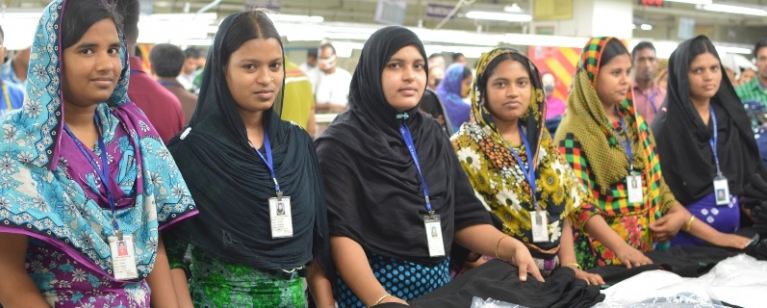
After attending a series of ETI workshops on Base Code Clause 2, major retailer Debenhams set itself an ambitious business challenge; embedding worker representation across its own bought supply chain.
We caught up with Mofe Lepe (Senior Ethical Trade Manager and Team Leader), Ramesh Panavalli (Ethical Trade Manager) and Laura Rushbrook (Ethical Trade Specialist) from the company’s Ethical Trade Team to talk us through how they did it.
Debenhams sources from more than 30 countries, comprising of over 700 production sites and more than 400,000 workers. In March 2018, the company committed to the British Retail Consortium Better Retail Better World Sustainable Development Goals, which formed the pillars of the Corporate Social Responsibility strategy – equality, community and environment. Decent work (Goal 8) and reducing inequalities (Goal 10) helped to sow the seed to progress towards worker representation. The series of informative workshops attended by the ethical trade team paved the way in supporting the Debenhams team to focus on a worker representation strategy for the company.
“Being able to network and share experiences with different brands gave us lots of ideas,” recalls Ramesh. “The workshops looked at the ETI Base Code 2 guidance documents in detail and outlined the process for conducting risk analyses in key sourcing countries. We went away realising that in order to really understand our suppliers’ needs, we had to understand workers’ needs. The insights we were receiving from audit data was limited in guiding our strategic direction or supporting our sourcing decisions.”
The team set about implementing a phased worker representation strategy, with support from ETI’s Senior Industrial Relations Advisor Bev Hall.
The first stage involved mapping worker representation levels across the company’s entire factory supply chain, identifying and ranking salient risks and developing an ethical grading system for all factories. The team worked with the ETI and colleagues from its global sourcing offices to develop a worker questionnaire and factory grading process in relation to levels of worker representation at each site. Some of the findings from the initial mapping was that just over a fifth (21%) had very little or no worker representation, 59% had worker representation and committees, but no active trade unions and 20% had an active trade union presence with functioning, elected union representatives.
For next steps the team created an action-plan for factories at each level, based closely on ETI’s FOA and worker representation roadmap which will form the basis of discussions with factories on how they can improve on worker representation at site level.
While the data was looked at for both gender and country perspective, the teams in country have started validating the data by visiting the suppliers and talking to the workers in person.
The challenges the team faced will be familiar to many ETI members. During the start of the process, mention of freedom of association and trade unions in meetings was met with ‘trepidation’. “We knew we needed to start the journey and ensure that every part of the business was behind this, but we also knew this was a big change. To succeed, we had to make a strong business case for FOA and empower colleagues at every tier of the organisation to help deliver it. But we also knew we had to proceed at a pace the business would feel comfortable with.” - the team mentions
The team combined training of internal teams on the business case of FOA with pilot testing with 15 key suppliers in 5 countries, which involved feedback on the questionnaire.
“We briefed our commercial teams and CSR working group, whilst provided training for the ethical trade teams and auditors on the ground, explaining the business case, and how FOA would increase productivity and worker retention and help suppliers. The reception varied from country to country, but it enabled us to start those all-important conversations and to build trust with suppliers.”
The FOA Questionnaire is now included in the pre-qualification and onboarding process for all new suppliers. It is incorporated into the third-party audit programme and has been embedded within the sourcing process.
“What really helped was the fact that the move was fully supported by senior management,” explains Mofe. “The Director of Stores & Supply Chain Technology is a Board Sponsor for CSR across the entire business. She is very passionate about it and sees CSR as ‘everybody’s business’ and wants to embed it at every level. As a team, it was our role to coordinate that, and support implementation”
“As a brand we understand we have leverage. It’s important to use that leverage to show leadership, which is why Debenhams is committed to sharing what we have learned from this process and collaborating with other ETI members looking to empower workers.”
Ramesh Panavalli, Debenhams
Since the commencement of the programme in May 2019, Debenhams has mapped 65 % of worker representation levels of its tier 1 supply base. In 2020, the target is to complete 100% mapping and then commence on providing awareness, guidance and training to the factories to support the implementation of the Base Code 2 on freedom of association, collective bargaining and worker representation. ETI handbook and guidance document on progressing worker representation will be a valuable tool to support this.
“There’s still a way to go, and we are still collecting information,” comments Ramesh. “But the programme is already informing what we do. Before, the only information we were receiving was from audits but now, we’re receiving real-time insights that are informing our business strategy and helping us make decisions about where to focus our resources and build capacity.”
